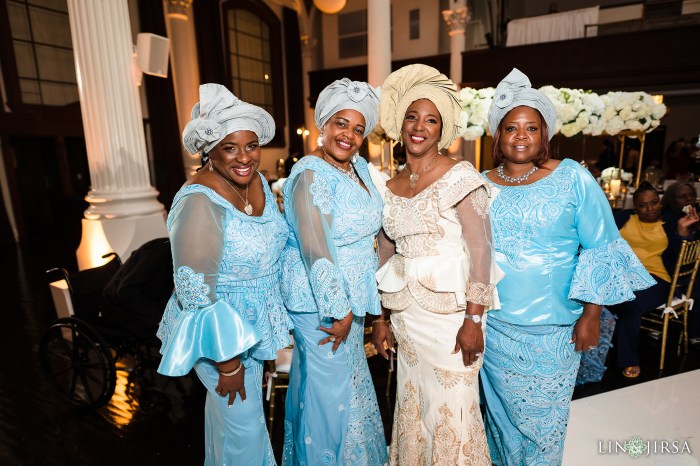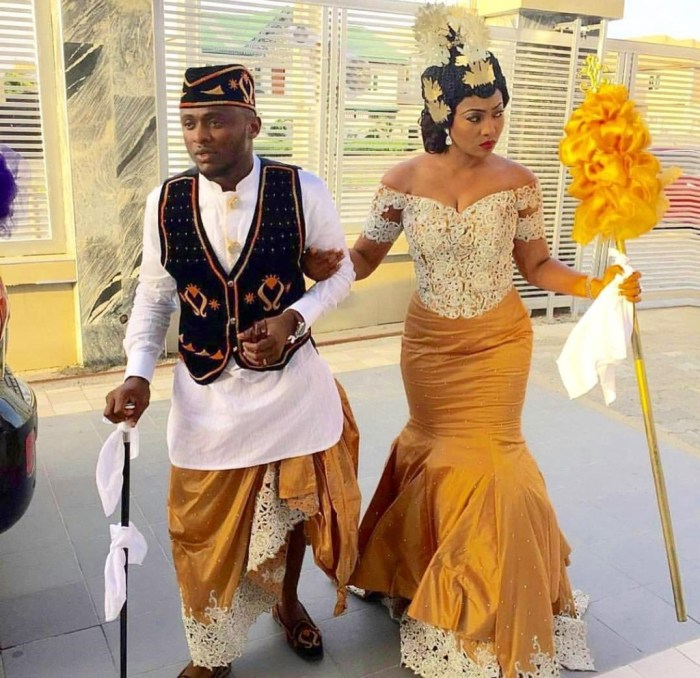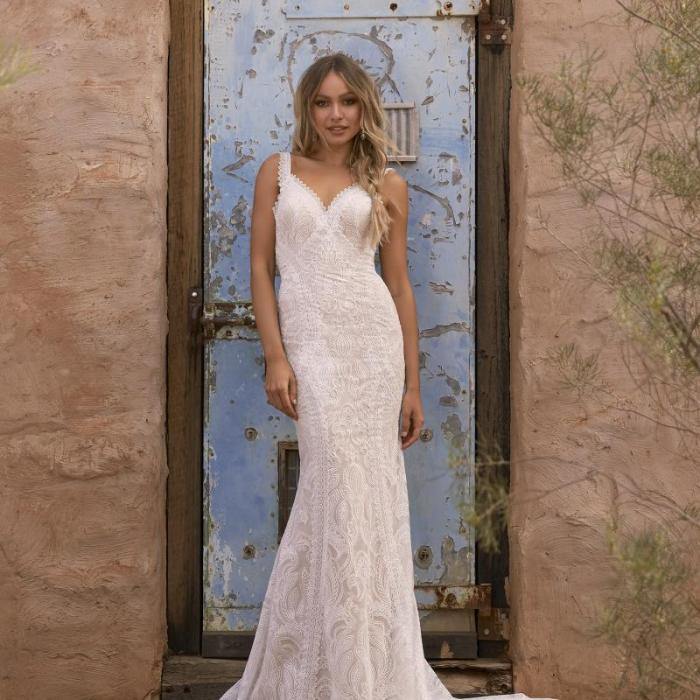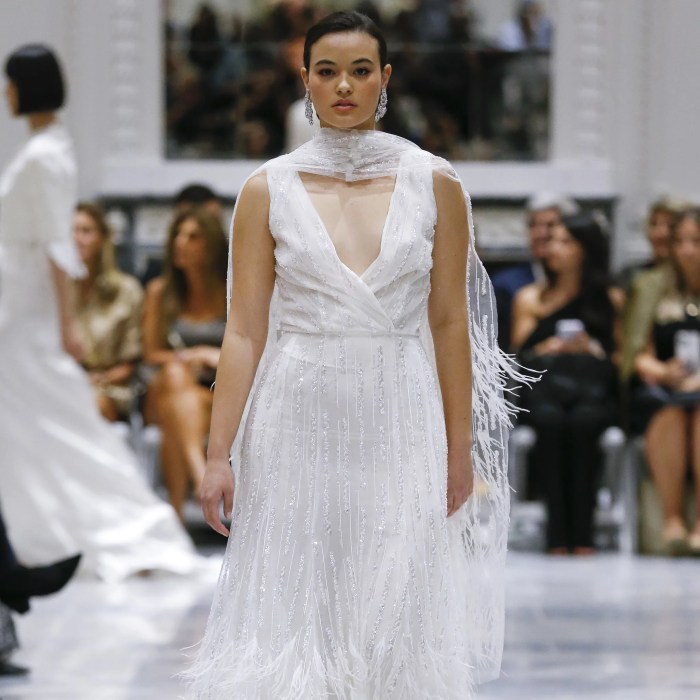Nigerian African Wedding Dresses: A Celebration of Style and Tradition

Source: linandjirsa.com
Nigerian african wedding dresses – Nigerian weddings are vibrant affairs, rich in culture and tradition, and nowhere is this more evident than in the stunning wedding attire. From the intricate beading to the bold colours and luxurious fabrics, Nigerian wedding dresses are a testament to the country’s diverse heritage and artistic flair. This exploration delves into the various styles, fabrics, symbolism, and modern interpretations of these captivating garments.
Styles of Nigerian African Wedding Dresses
Nigerian wedding attire showcases a remarkable diversity, reflecting the country’s numerous ethnic groups and regional variations. Traditional styles often hold significant cultural meaning, passed down through generations. The most prominent styles include those associated with the Yoruba, Igbo, and Hausa tribes, each possessing unique characteristics.
Yoruba wedding dresses are often characterized by their elaborate designs, rich colours, and the use of intricate beadwork and embroidery. Igbo styles frequently feature bold prints and vibrant colours, reflecting the region’s lively cultural spirit. Hausa wedding dresses, on the other hand, often exhibit more restrained elegance, with a focus on refined silhouettes and luxurious fabrics. The concept of aso ebi, a uniform fabric worn by wedding guests, is a central element in all Nigerian weddings, symbolizing unity and shared celebration.
| Style | Fabric | Embellishments | Silhouette |
|---|---|---|---|
| Yoruba | Lace, Aso Oke | Beading, Embroidery, Coral Beads | A-line, Mermaid |
| Igbo | Ankara, Silk | Appliqué, Embroidery | Fitted, Flowing |
| Hausa | Brocade, Velvet | Gold embroidery, intricate beading | A-line, empire waist |
Fabrics and Embellishments
The fabrics and embellishments used in Nigerian wedding dresses are integral to their aesthetic appeal and cultural significance. Certain fabrics carry specific meanings and are associated with particular regions or traditions.
- Lace: Often imported, lace represents elegance and sophistication, frequently adorned with intricate patterns and embellishments.
- Ankara: A vibrant wax-printed cotton fabric, Ankara embodies the vibrancy and energy of Nigerian culture, symbolizing modernity and cultural pride.
- Silk: A luxurious fabric, silk adds a touch of opulence and refinement, suggesting wealth and status.
- Aso Oke: A hand-woven fabric, Aso Oke is a symbol of prestige and heritage, particularly within the Yoruba culture.
- Velvet: Velvet’s rich texture and luxurious feel contribute to the opulence and formality of the attire.
Common embellishments include beading, embroidery, appliqué, and intricate detailing. These embellishments not only enhance the visual appeal but also often carry symbolic meaning within specific cultural contexts.
- Beading: Adds sparkle and texture, often representing wealth and status.
- Embroidery: Detailed stitching creates intricate patterns, conveying cultural stories and symbolism.
- Appliqué: Adds layers of texture and visual interest through the application of different fabrics.
- Sequins: Provides a glamorous and celebratory sparkle.
- Coral Beads: Often used in Yoruba attire, coral beads hold spiritual and cultural significance.
Color and Symbolism

Source: buzznigeria.com
Color plays a significant role in Nigerian wedding attire, carrying deep cultural and symbolic meanings that vary across different tribes and regions. Certain color combinations are associated with specific events or stages of life.
| Color | Symbolic Meaning | Tribal Significance (Example) |
|---|---|---|
| Red | Love, passion, fertility | Often associated with marriage ceremonies across various tribes. |
| White | Purity, innocence, new beginnings | Commonly worn by brides, symbolizing a fresh start. |
| Gold | Wealth, prosperity, royalty | Often incorporated into embellishments, signifying status and affluence. |
| Green | Growth, fertility, prosperity | Can symbolize new life and abundance in some tribes. |
Modern Interpretations of Traditional Styles, Nigerian african wedding dresses
Contemporary Nigerian designers are skillfully blending traditional elements with modern aesthetics, creating unique and captivating wedding dress designs. This fusion respects cultural heritage while embracing contemporary trends.
For instance, a traditional Yoruba adire fabric might be incorporated into a sleek, modern sheath gown, retaining the cultural significance of the fabric while updating the silhouette. Similarly, the bold colors and prints of Igbo styles might be reinterpreted in a contemporary jumpsuit or a high-low skirt and top ensemble.
Imagine a modern Nigerian wedding dress: a flowing A-line gown crafted from luxurious silk, adorned with intricate embroidery inspired by traditional Yoruba patterns. The gown’s sleek silhouette contrasts with the rich detail of the embroidery, creating a harmonious blend of tradition and modernity, finished with a delicate headwrap in a complementary shade.
Accessories and Headwear
Accessories and headwear are integral to the overall look of Nigerian wedding attire, often adding cultural significance and enhancing the visual impact. Headwear, in particular, plays a vital role in many Nigerian wedding traditions.
Three distinct types of headwear include the Gele (Yoruba), which is a head-wrap meticulously tied into intricate designs; the Igbo traditional head-tie, which often features vibrant colours and patterns; and the Hausa hila, a more modest head covering. These diverse styles reflect the unique cultural identities of each tribe.
- Necklaces
- Earrings
- Bracelets
- Anklets
- Rings
Illustrative Examples
A richly embellished Nigerian wedding dress might feature a voluminous ballgown silhouette crafted from Aso Oke, intricately embroidered with gold thread and adorned with thousands of sparkling beads. The vibrant red fabric, symbolic of love and passion, would be complemented by gold accents, representing wealth and prosperity. The overall effect is one of opulence and regal grandeur.
In contrast, a simpler, minimalist Nigerian wedding dress might be a sleek mermaid gown in ivory silk, featuring clean lines and a sophisticated silhouette. The absence of excessive embellishments allows the beauty of the fabric and the elegance of the design to take center stage. The overall impression is one of understated elegance and refined sophistication.
Nigerian African wedding dresses often showcase vibrant colors and intricate designs, reflecting rich cultural heritage. The styles range widely, from traditional adire to modern interpretations, but often incorporate elements of grandeur. For those seeking a more structured look, considering options like those found in a guide to formal attire wedding dress can offer inspiration for elegant silhouettes.
Ultimately, the choice depends on personal preference, but the resulting Nigerian wedding dress will undoubtedly be stunning.
A Nigerian wedding dress incorporating bold, vibrant colors might feature a flowing A-line gown in a striking combination of royal blue and bright orange Ankara fabric. These colors, depending on the specific tribe, could represent joy, fertility, and prosperity. The overall effect is one of joyful exuberance and bold cultural expression.
Common Queries
What is Aso Ebi?
Aso Ebi is a uniform style of clothing worn by wedding guests, typically in matching fabrics and designs, signifying unity and celebration.
How much do Nigerian wedding dresses typically cost?
The cost varies greatly depending on the fabric, embellishments, designer, and complexity of the design. Prices can range from a few hundred to several thousand dollars.
Where can I find Nigerian wedding dresses?
You can find Nigerian wedding dresses through designers both in Nigeria and internationally, online retailers specializing in African fashion, and at some bridal boutiques.
Are there specific etiquette rules for wearing a Nigerian wedding dress?
While there aren’t strict rules, it’s generally respectful to understand the cultural significance of the dress and to dress modestly and appropriately for the occasion.


